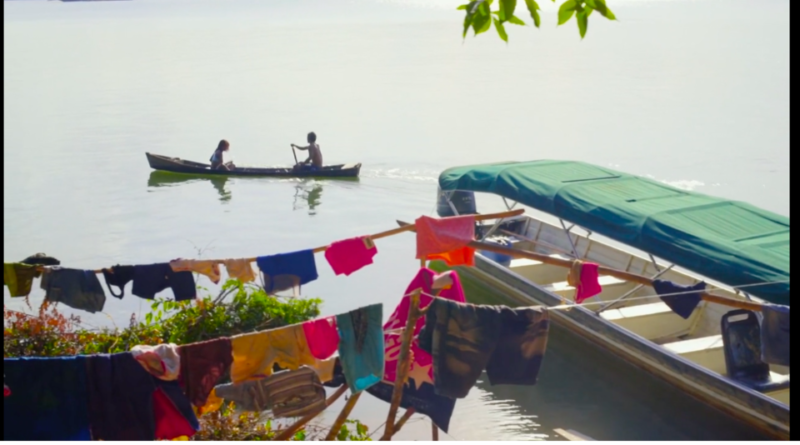INTERVIEW: Environmental challenges at the heart of ‘Sequestrada’
Photo: Sequestrada tells the story of a young girl who is kidnapped after protesting the building of a dam in the Amazon. Photo courtesy of film’s official website / Provided with permission.
The new environmental thriller Sequestrada, written and directed by Sabrina McCormick and Soopum Sohn, follows a young indigenous girl who is kidnapped in the Brazilian Amazon after she and her father decide to protest the building of a controversial dam. The fictional film stars Gretchen Mol and Tim Blake Nelson, in addition to newcomer Kamodjara Xipia de Ferreira.
McCormick, who also produced the project, has been on a long journey to finish this movie, with many obstacles along the way.
“It was definitely more work than I ever anticipated, so I’m very happy to see it finally coming to fruition,” she said in a recent phone interview. “I have been working in Brazil for approaching 20 years on energy issues. The primary energy source in Brazil is large hydroelectric dams, and so I have a PhD in sociology. So I did some of my dissertation work in Brazil on that issue, and I made my first documentary short many years ago about that topic.”
McCormick and Sohn, both professors, met because they had a friend in common, and when the two connected, they started to think of a fictional story that could tie many of the their interests — indigenous rights, environmental degradation, geopolitics, climate change — into one narrative. The result was Sequestrada, which premiered at the Beijing International Film Festival.
“I was in the process of planning to go down there to do work funded by the United Nations and wanted to start making the project, and he and I decided to start collaborating together,” McCormick remembers. “At that time, the backdrop of the film, which is the Belo Monte Dam … was even more contested than it is now and was not fully constructed.”
Some of the inspiration for the indigenous cultures in the story came from McCormick and Sohn’s travels in the Amazon and what they were experiencing in a variety of communities. When they decided to start producing the film and bring in professional actors and nonprofessional actors, the challenges started to mount almost immediately.
“It was challenging in a number of ways,” she said. “So this dam project was so controversial that while we were shooting … there were three different kinds of police there all with machine guns, so on the street you regularly were seeing pairs of police people with machine guns just making sure that chaos didn’t break out because there were these constant protests being brought by indigenous people and people who supported them.”
McCormick, who was lead author on the Nobel Prize-winning Intergovernmental Panel on Climate Change, was also subject to the harsh natural elements in the local area. The temperatures rose to astounding levels, and mosquito-born illnesses were a constant fear.
“Shooting in the Amazon, as you might imagine, is really tough, so you have every kind of mosquito-born disease going on there and constant attacks by the mosquitoes, which will drive you nuts,” said McCormick, whose work has been published in Science, Nature and Climatic Change. “When you’re shooting also it’s so incredibly hot, and you see in some of our scenes that we’re shooting inside the houses. … And when you’re in the house, with the door shut, trying to shoot a night scene during the day, the temperature inside that house is going up to I don’t know 110-115 degrees, plus 90 percent humidity. So those kinds of environmental conditions are really hard.”
At one point, an actor in the film gave McCormick a bracelet to wear. The gift was appreciated at first, but then there was tree sap on the bracelet that gave her contact dermatitis. It was off to the hospital to take care of the inflammation.
“Shooting with that many indigenous non-actors was really one of the most fascinating experiences in my life and also one of the most challenging because getting used to the way that they function and their cultural norms as compared to mine was like a whole process unto itself,” the co-director said. “By the end, and over these years that we were shooting with them, we came to be friends. I feel like we loved one another, and also it took some real learning about each other to get there.”
The result is a film that McCormick hopes will influence people but perhaps not in a direct, activist way. She simply wants audiences, who are currently catching the film in New York, to appreciate the underlying lessons and draw their own conclusions.
“I am 100 percent committed to just telling a good story and knowing that that is the only way that you A) get people to watch the film and B) really get people to be entertained and have feeling about what they’re watching, which is all you really want as a viewer,” McCormick said about Sequestrada, which is available on VOD in December. “That was 100 percent my top priority in making this film: doing something that captured the heart.”
By John Soltes / Publisher / John@HollywoodSoapbox.com
Sequestrada, written and directed by Sabrina McCormick and Soopum Sohn, is playing in New York City and will soon be available on VOD. Click here for more information.

